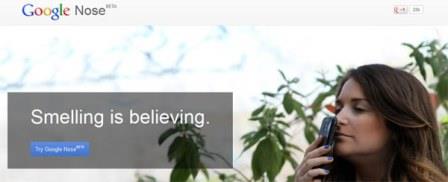Google Nose: A Tech News For April Fools: Google Nose is Fake, April Fool’s Day started early in Silicon Valley, where pranks and hoax announcements are a hallowed rite of the tech industry. It is, according to Google, the new “Scentsation” in search: Google Nose.

Google Nose is not real; it’s among the company’s many April Fool’s Day jokes. But the idea of a an artificial nose—something that would navigate the world solely using its sense of smell—isn’t a joke at all.
What, exactly, is the value of an electronic nose? “This American Life’s” Nancy Updike did a piece on it last year, and found a few.
“Factories could put electronic noses throughout their plant to detect dangerous gases that might be leaking during the manufacturing process,” she reported. “Doctors could use a handheld electronic nose to diagnose pneumonia and other conditions that have distinctive smells.”
Google followed up Monday with a half dozen other joke announcements, including such nonexistent products as “Nose,” described as a new service that lets people search online for examples of different scents. Google said its “Street Sense” vehicles had traveled the world, collecting different aromas for a digital database of olfactory sensations, including “cabernet” and “wet dog.”
But Google wasn’t the only prankster in the valley. EFI, a digital printing company, issued a news release satirizing the flap over Yahoo’s recent ban on working from home. Starting Monday, EFI jokingly announced, a new program called “Home Share” would allow the company’s employees to work from their co-workers’ homes.
Twitter, meanwhile, unveiled a new plan to increase revenue from its popular micro-blogging service. From now on, the company said, the service would only be free to users as Twttr, allowing people to post as many short messages as they liked, provided they used only consonants.
“For five dollars a month,” the company said on its blog, “you can use our premium ‘Twitter’ service which also includes vowels.”
Other tech companies got into the act. Microsoft tweaked its Bing search engine so that anyone typing in the word “Google” was taken to a bare-bones page that resembled Google’s own home page, except for a few snarky messages and an “I’m feeling confused” button instead of the “I’m feeling lucky” button that appears on Google.com.
Google fired back with an announcement for “Gmail Blue,” supposedly an update of Gmail that satirized Microsoft’s plans for a new version of Windows, code-named “Blue.”
A satirical video featured an earnest product manager who described the company’s challenge as, “How do we completely redesign and recreate something while keeping it exactly the same?”
Sony also posted a video announcement for a new line of consumer electronics products for pets, including high-end audio headphones for cats and a canine television set that shows only blue and yellow, since dogs have trouble seeing red or green.




